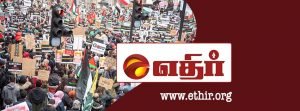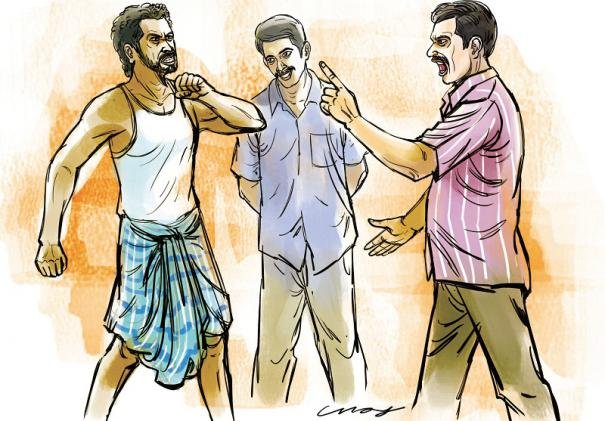Rajapakse back in power-Tamil-speaking masses reject the warmongers
The victory of Mahinda Rajapakse as the sixth executive president of Sri Lanka was announced today at the election commissioner’s office. At the election announcement, dubbed a ‘funeral ceremony’, none of the presidential candidates spoke and Mahinda himself was unceremoniously low key and spoke from his chair instead of going to the stage and left immediately after. At the same time ex?- General Sarath Fonseka, the main opposition candidate was kept under heavy military guard at a Colombo hotel by the Rajapakse regime.
Prior to the election Tamil Solidarity (TS) pointed out that there was no real choice between the two leading candidates. The only difference between them arose from a feud over who was responsible for more killings in the war against the Tamils and who could claim the war victory for their own! TS warned against the hypocritical stand of the majority oft he Tamil National Alliance (TNA) who supported Fonseka, based on the vague promise of ‘regime change’. This tactic took the flawed approach of short-term ‘lesser evilism’ to the extreme and offered nothing to the ordinary masses. TS, in contrast, with the long-term struggle in mind, insisted on using the elections to help build an independent force for the future. In this we worked with forces based on the struggle of the workers and poor to end capitalism and landlordism such as that of the United Socialist Party (USP).
Now the country faces another period of onslaught by the Rajapakse regime. Fear and persecution will continue for all the opponents of this regime. Time and time again the Rajapakses have proved that they are ready to go to any lengths to keep themselves in power. Before the election took place the opposition candidate, Fonseka, had spoken of mobilising against Rajapakse on the streets if he was defeated and was then virrtually held captive by Rajapakse’s forces. This in turn suggests that the Rajapakse family would have gone so far as to stage a coup had Fonseka been declared winner despite the rigged election. In fact this election is an ‘electoral coup’ staged by the Rajapakse regime.
According to the Department of Elections, Rajapakse managed 57.8% of the vote against his opponent who received 40.1%. This was nowhere near the two-thirds majority for Fonseka required to abolish the executive presidency, as he promised. It was quite clear well before the election that the talk of a Fonseka victory leading to the abolition of the executive presidency was designed to woo the Tamil-speaking voters. The section of the TNA who argued the case for Fonseka is now exposed.
Noticeable in this election is the low participation of the Tamil-speaking masses. Rajapkse’s victory in the 2005 election was based purely on the Sinhala majority’s vote, due to the mistaken boycott called by the TNA and the Liberation Tigers of Tamil Eelam (LTTE). His regime, with the help of paramilitary forces, has now done everything possible to prevent the Tamil-speaking people having a say in this election.
Several grenade attacks took place between 2am and 4am on polling day in the north and east. In another incident the house of Suresh Pramachandran, a TNA MP, was attacked by thugs who came in a ‘white van’. Only one week before polling day the Election Commissioner announced that the internally displaced people (IDPs) should register if they want to vote.
Around a quarter of a million people are considered to be IDPs and among them over 100,000 are still kept in detention camps. They have no say whatsoever in terms of how their lives are run. The authorities made no effort to inform them of the election procedures or to assist them in exercising their democratic rights. Instead, on the day of the election, the buses that were supposed to take the IDPs to the north for voting vanished. Lack of interest in the election plus intimidating tactics resulted in the lowest turnout in the north and east provinces. With only just over 25% voting, Jaffna had the lowest turnout in the country. Not so surprisingly, Rajapakse’s worst performances in the election were in the north and east.
The attempts by Rajapakse to prove that the Tamil vote did not count in the presidential election were helped by the TNA’s opportunism. They even sidelined a TNA MP – Sivajilingam, the only Tamil candidate to stand in the election – to support the warmongering Fonseka. The Tamil media in Sri Lanka, which represents the interests of the elite and middle layers in the country, was also split between both warmongers. This criminal mistake of the TNA will be remembered by the poor masses. Within months of witnessing the butchery of hundreds of thousands of innocent civilians, they took the decision to support the butcher himself! There is no justification for this. The victims of this war have not even had enough time to grieve for their losses and many carry still fresh scars of the war, including shrapnel in their bodies. Scandalously the TNA asked these victims to vote for their very persecutors.
Now we have the horror of a second term of the Rajapakse regime. It will now be extremely difficult to unearth the war crimes or even the recent election crimes as its control grips the whole island once again. The volatile period during the election was not used by the Tamil elite to establish strong independent forces. There is no major force in the country that can put a challenge to this regime. Such bravery can however be found among the at present smaller voices. Siritunga Jayasuriya of the USP, supported by Tamil Solidarity, gained more than 8,000 votes with a significant vote in the north and east despite the blackout of his election programme in the media. Wikramabahu Karunaratne followed Siritunga with over 7,000 votes. This is despite the political and financial support he received from Sivajilingam and a few other Tamil MPs. His unprincipled alliance with the Tamil elite made him incapable of building any real resistance. Now the huge responsibility to build the fightback in a most difficult time falls into the hands of those who argue for the complete transformation of society.
Immediately after the election result was made known, the socialist fighter, Siritunga, stated that the most important task now is to provide an uncompromising trustworthy leadership for the fightback that is so urgently needed. There is no other hope for the working and poor masses other than the building of a revolutionary force, bringing together all the oppressed masses to change society once and for all and for the benefit of all. Only then can the national aspirations of the Tamil-speaking masses be realised along with the emancipation of the poor and workers of all backgrounds.
It is time now that those who are serious about building such an independent force to get rid of chauvinism, nationalism, capitalism and landlordism come forward and participate. Let us not take the same rotten route that the Tamil United Liberation Front (TULF) has led us into since independence and that the TNA is now intending to do. Let us not stand back to watch the oppressed people be further exploited by false promises.
Please contact us to discuss these proposals about how we can build a mass force to transform our society and the lives we live.



















